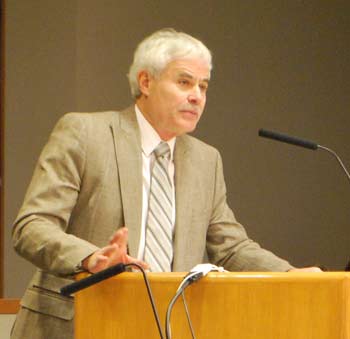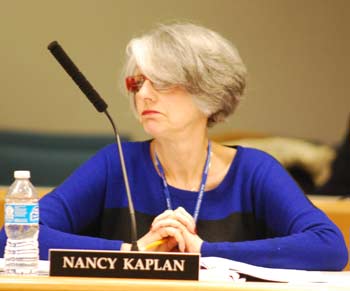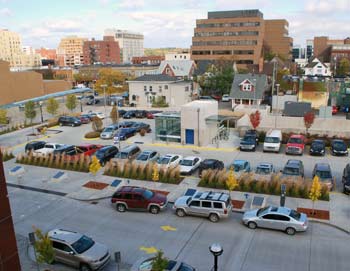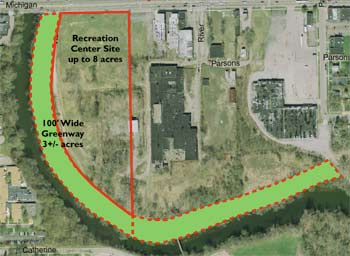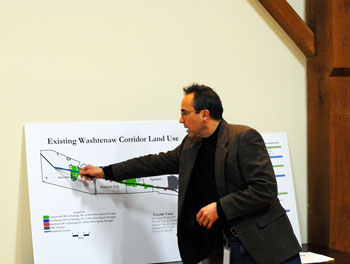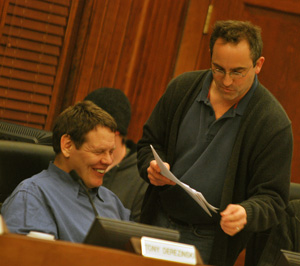Washtenaw County board of commissioners meeting (Nov. 6, 2013): At another nearly six-hour meeting, county commissioners handled a full agenda with several major action items, including the 2014-2017 budget.
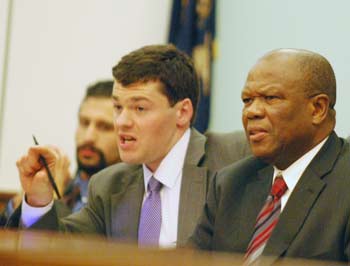
From left: Washtenaw County commissioners Yousef Rabhi (D-District 8), Andy LaBarre (D-District 7) and Ronnie Peterson (D-District 6). (Photos by the writer.)
Following about three hours of debate and some minor amendments, commissioners gave initial approval to the proposed four-year general fund budget, for the years 2014-2017. The 7-2 vote came over the dissent of Dan Smith (R-District 2) and Ronnie Peterson (D-District 6), who cited concerns over a budget cycle extending for four years rather than two.
Much of the budget discussion focused on the sheriff’s operations. No layoffs are proposed, but 8.47 FTE positions would be kept unfilled. Most of those are in the sheriff’s office, which has a targeted budget reduction of $1.34 million. Sheriff Jerry Clayton, an elected official, attended the Nov. 6 meeting and addressed the board, telling commissioners that his office can’t continue to absorb budget cuts without affecting services. “For me not to tell you what I believe the impact on public safety is, if you make those cuts, would be negligent in my responsibility as the county sheriff.”
Board chair Yousef Rabhi (D-District 8) countered that every department head could make arguments against budget cuts. Noting that more revenues are needed, Rabhi said he hoped commissioners would support putting a countywide public safety millage on the ballot.
During public commentary after the budget debate, county prosecuting attorney Brian Mackie told commissioners that they had a difficult job, but that they were making it harder than it needed to be. He suggested looking for guidance in the state constitution, and relying on the experience of county administrator Verna McDaniel. Mackie also questioned whether commissioners were truly committed to public safety as a priority. He praised Clayton, noting that the sheriff is a respected figure with a national reputation. “He might know more about safety and criminal justice than you do,” Mackie said.
The budget must be given final approval by the end of the year, and only two more board meetings scheduled: On Nov. 20 and Dec. 4. The board will also hold a second public hearing on the budget on Nov. 20.
Several other agenda items related directly or indirectly to the county’s budget. On a 7-1 vote, the board gave final approval to an increase in the levy of the economic development and agricultural tax, known as Act 88 of 1913. The increase to the Act 88 millage is from 0.06 mills to 0.07 mills. Dan Smith (R-District 2) dissented and Rolland Sizemore Jr. (D-District 5) had left the meeting by the time the vote occurred, just after midnight. Smith questioned the constitutionality of the county levying this tax, as well as the legality of how the revenues are spent.
During public commentary, the board also heard from two people who objected to the tax levy, including Bill McMaster of Taxpayers United. McMaster, who helped lead the statewide campaign that resulted in passage of the Headlee Amendment in 1978, noted during public commentary that there’s a provision in the law allowing for legal action if taxes are raised without voter approval. It’s an action “which we will pursue,” he said.
The board also unanimously approved a tax-sharing agreement to allow a portion of county taxes to be captured by Pittsfield Township’s State Street corridor improvement authority (CIA). Pittsfield Township supervisor Mandy Grewal addressed commissioners during public commentary, thanking them for their support of the CIA. One opponent to the CIA – former township official Christina Lirones – spoke during two opportunities for public commentary, urging the board to opt out of the CIA.
Other items handled during the Nov. 6 meeting included (1) final approval to extend the coordinated funding approach for human services, as well as to authorize some changes in that funding model; (2) appointment of an advisory committee to propose options for county property on Platt Road; (3) final approval of a brownfield plan for Chelsea Milling Co. (Jiffy Mix); and (4) appointment of Ellen Rabinowitz as temporary health officer to replace Dick Fleece, who’s retiring at the end of 2013.
Communications during the meeting included public commentary from supporters of the Delonis Center homeless shelter in Ann Arbor, and concerns about state standards for permissible levels of 1,4-dioxane. [Full Story]
